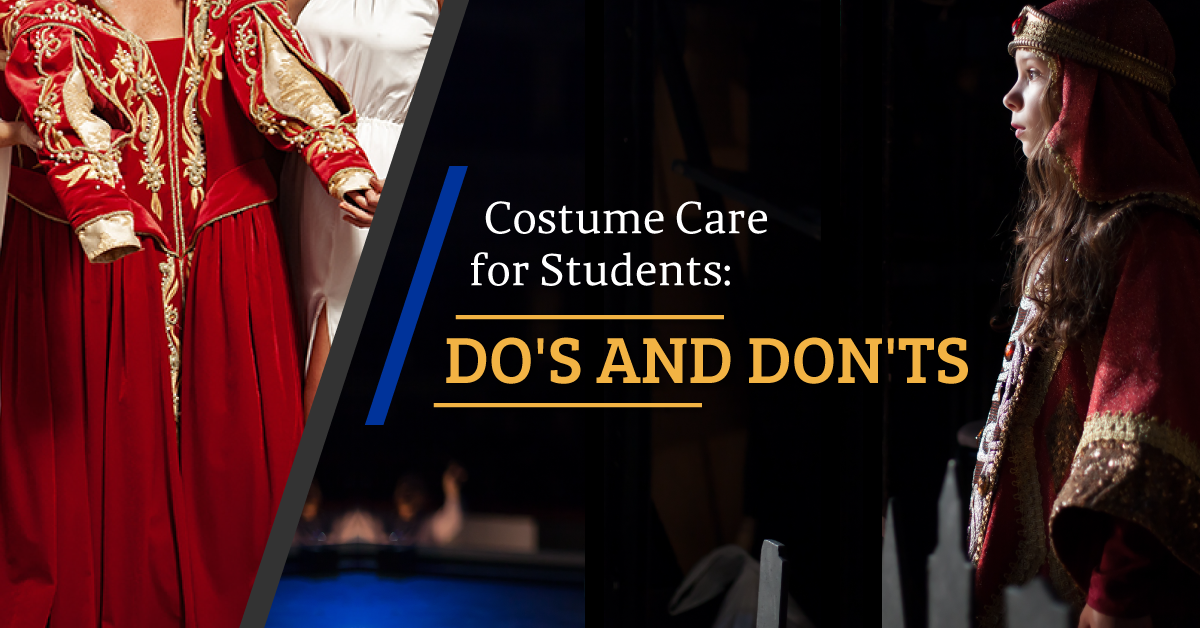Costume Care: Dos and Don’ts
Teachers, the following list of dos and don’ts is a great way to introduce costume care etiquette to your students. Whether your students are beginning actors or seasoned drama department pros, costume care is a vital skill that all students must have._
With proper knowledge of costume care etiquette, students who are interested in costume design and creation, as well as parent volunteers, will be empowered to both enforce these rules and receive the proper respect from the rest of the group for their time and hard work. Mutual respect between the performers and crew members goes a long way!
Have all your students to read these dos and don’ts, and challenge them to come up with some more examples to add to the list. Discuss why costume etiquette is so important for both performers and costume team members. Divide the class into small groups, assign each group a Do or a Don’t, and have them create an attractive poster illustrating the rule. Display the posters in your classroom or costume storage area.
Do listen to and respect the costume team. They are there to make you look great onstage and they have an entire cast of students to focus on, not just you. Whether your costume was pulled from stock, purchased, or created from scratch, it was assembled specifically for you. Listen, be polite, and thank the team for their hard work!
Don’t treat the costume team as if they are your personal maids and butlers. They are not there to pick up your costume or clean up after you. Hang up your costume neatly rather than leaving it in a heap on the floor.
Do wear your costume how it is supposed to be worn. Maybe you don’t like wearing a skirt at your natural waist or you feel silly wearing a neckerchief, but it is meant to look a certain way onstage. Be sure to wear all the parts of your costume. For example, you may not like your costume hat and want to “forget” to put it on, but you will pull focus onstage without it and not in a good way.
Don’t reject a costume just because you don’t like it, or before you’ve even tried it on. Items always look different on a hanger or lying flat than they do when they’re actually worn on a person. Remember as well that while YOU, the actor, may not like a certain costume item, it is entirely appropriate for YOUR CHARACTER, who may have different likes or dislikes from yours, or live in a different time period than you.
Do speak up if a costume doesn’t fit properly or pinches, pulls, rides up, or digs in. You need to be comfortable onstage in your costume, and you will not be able to focus if you are constantly picking or adjusting it. Also, be sure to tell the costume team if you have to do something particularly physical in a costume, such as a high kick or the splits and you have concerns about the fabric tearing.
Don’t wait until the last minute to let a costume team member know about a broken or damaged costume item. If you let them know as soon as possible (preferably as soon as you notice the damage), they’re more likely to be able to help replace or repair the item. If you bring them a problem half an hour before the performance starts, they are less likely to be able to solve the problem.
Do ask for help (politely!) if you need assistance with a quick change, or help with a particular part of your costume – for example, zipping up a zipper on the back of your dress, or buttoning the cuffs of your sleeves. Costume team members are happy to help, but they can’t help you if you don’t ask.
Don’t touch or try on other actors’ costume items. Just like props, if it’s not yours, don’t touch it. (You wouldn’t like it if you went to do a quick change and discovered an item of yours was moved, missing, or damaged.)
Do bring in requested items from home (such as dress pants or black shoes) in a timely manner, clearly labeled with your name.
Don’t eat or drink anything other than water while in costume. If you need to eat something, either change out of your costume or cover it up with a coat or robe. Do not risk spills or stains on your costume!
Do pay attention to details – ensure that your socks are the correct colour to go with your costume, that your shoes are clean and polished, that all of your accessories are on properly, and that your undergarments are not visible.



